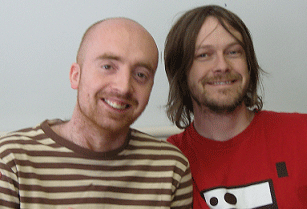Introduction
Paris GDC is the second French edition of the Game Developers Conference, the most important event in the industry.
It will bring together top developers from the European community and abroad, who are eager to share their experience, exchange ideas, and show the latest innovations in current -generation of game development.
Paris GDC is geared towards inspiring a ground-breaking new-generation of developers. The event is structured around core technical expertise, and focuses on state-of-the-art current generation console and PC development, including multi-platform development.
The Conference focuses on Building Great Games: Core and Casual
Keynotes



In the Eye of the Blizzard: a Keynote Q&A with Rob Pardo
In this keynote Q&A, GDC Events executive director Jamil Moledina interviews Pardo on his inspirations, challenges, and next steps at Blizzard. The discussion is informed by Blizzard's lessons learned, resources unlocked by its success, and the raw talent in evidence in the company's development team. Moledina also includes questions submitted online from the community of developers in the myGDC forums, to give everyone a chance to participate.
Keynote: Scenes from Battlefield: The Present and Future of Core and Casual
In this keynote session, the game's project lead talks about the business and consumer trends that lead to the creation of this new service, and in his role as the Executive Producer for the Battlefield franchise he shares his thoughts on the future crossover of core and casual gamers and the supposed 'death' of the PC as a gaming platform.
Opening Keynote: Little Big Planet, Little Team, Big Ideas
Healey and Evans will address the breadth of ways in which game developers can incorporate creativity into their designs. From god-games and sim-games to full-on modding, they will discuss the past, present, and future of user-generated content as illustrated through the story of Media Molecule's conception and its first title, LittleBigPlanet for the PlayStation 3.
Session Picks
Here's a session from each track that caught my eye.
Programming / Coding Track
Camera-Based Gaming: How to Do It and Why you Would Want to
Intended Audience / This presentation is suitable for people from any discipline at any level. There is no prerequisite knowledge. The techniques are explained in some depth, so expect to have your brain exercised however, all the explanations are very visual.
Take Away / Attendees learn the principles underpinning a broad range of computer vision techniques and how they can be applied to games. They understand the main pitfalls to avoid and where the genre is heading in the future.
Description / Diarmid talks about camera-based games such as those using the EyeToy and the PlayStation Eye. He looks at many different techniques that can be applied to analysing video images such as image differencing, optical flow, chamfer matching and face tracking. He explains how they work, ways in which they can be used as a game mechanic and where they can fail. The presentation will be illustrated with plenty of videos and live demos to keep you awake. It looks at techniques from past games but also those from games currently in development and those on the horizon.
Why I'm Interested / Ever since I was a kid at Disney World and playing games at Epcot where you stood in front of a greenscreen and popped bubbles or pushed objects or swung at virtual baseballs - camera games have evolved greatly over the years to now be available in my living room. In addition to using your body to control the game world, there are even companies out there looking to let you use everyday objects as joysticks and racing wheels held in front of a camera.
Game Design Track
The Right Tools for the Write Job
Intended Audience / While the session will cover some advanced topics, the material will benefit game designers of all levels. This will appeal to any designer interested in using narrative in their games as a mechanism to immerse the player in their world.
Take Away / Great writers can make great stories for games, but in the next-gen game world, they need great tools to support them. BioWare utilizes a robust suite of tools that will hopefully offer some insights for others in the industry as well.
Description / "One of the most frequent questions asked of me is, ""So, what do you write all that dialog in anyway? Excel?"". Not any more! Great dialog needs great writers, but in the games industry you need great tools to support your writers. More than that, you need tools that allow your writers to share content across the project. How does dialog get translated into scripts for the VO actors? How do your plots and missions get turned in to gameplay? How does an idea for a cutscene become a reality? What about localization? This session will take a close look at the tools and systems used at BioWare to create truly collaborative writing."
Why I'm Interested / Bioware is certainly well-known for it's narrative and story telling - wouldn't you like to know how they do it? I mean like, what other tools are there besides Word?
Production Track
Bend Microsoft Project to Your Will
Intended Audience / All audience
Description / Almost everyone agrees that scheduling game production with Microsoft Project is somewhere between difficult to impossible. This lecture will show tricks in Microsoft Project learned over ten years of consistent use. Attendees will see how to organize their schedules, learn the difference between using priorities and links, how to schedule milestones, understand how to use custom working schedules, and see how to enter extra data into their schedules to keep everything in order. Attendees will also see how to keep their schedule up to date, making it a consistent and near-perfect picture of the current state of their project.
Why I'm Interested / Okay okay, I'm a bit of a fan in this case - Mr. Mike is a great guy with a ton of hard-won industry knowledge he loves to share (read his books?). Besides, MS Project is the scheduling app that everyone loves to hate, so if you're stuck with it you might as well learn how to make the best of it right? Who knows, maybe after this you'll actually like it.
Visual Arts Track
Intended Audience / Attendees should understand the often unobserved yet simple principles of how light works in the real world after seeing many images and descriptions and practical demonstrations of how to apply this knowledge to their own image creation. .
Take Away / The session covers topics that apply to all fields of the arts, and though the content does get advanced in it's theories it is easily interpreted by all. It covers basic principles of light and color that both novice and pro will find informative.
Description / see of the world around us, and how to apply this knowledge to lighting and image creation. The principles discussed apply to all types of art, in both 3D and 2D applications and will cover subjects such as bounced light, shadows, color temperature, relative saturation, cinematic lighting principles, camera effects, art study and a lot of practical application in both 3d and painted forms.
Why I'm Interested / It's no secret that lighting in games is still the one graphical element that's lagging the most these days, simply due to the huge processing requirements to render light realistically. While this session won't cover ways to solve lighting issues directly for in-game rendering - the more you understand the behavior of light the better you can model your characters to take advantage of whatever lighting your game engine provides for you. And after seeing Pixar's latest work in Wall-E, you can tell they know about light.
Business / Management Track
How to Create an Industry the Making of the Brown Box and Pong
Intended Audience / The conference targets all audiences.
Take Away / Attendees will remember an extraordinary Character who has greatly contributed to the development of a worldwide industry.
Description / Ralph Baer details the different steps on his creation of the video game: from the very beginning to the final version featuring several innovative ideas such as an Internet precursor. At the end of the conference, Ralph Baer will switch on the Brown Box to show the video games of 1968.
Why I'm Interested / Well, besides hearing Ralph Baer speak about his game creation process, you get to see the Brown Box in action. Still, if you're not a fanboy or don't like learning from the past, you could always attend The Long View Into the Future instead.



